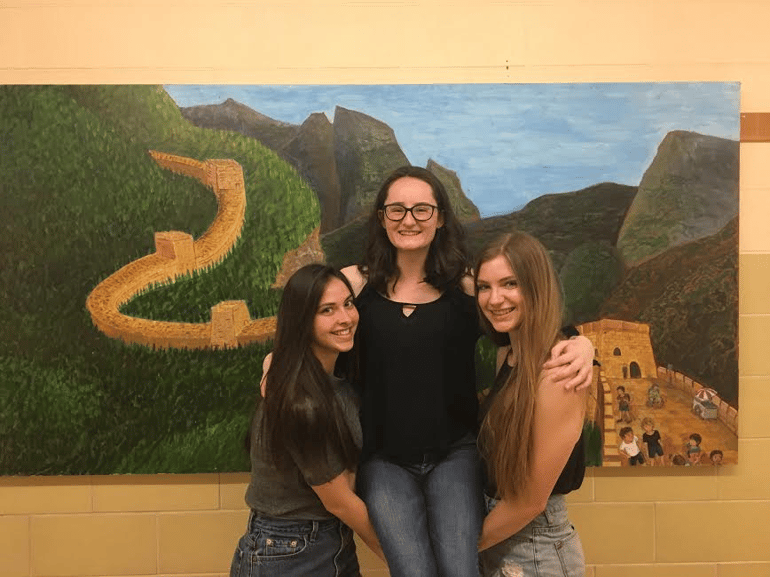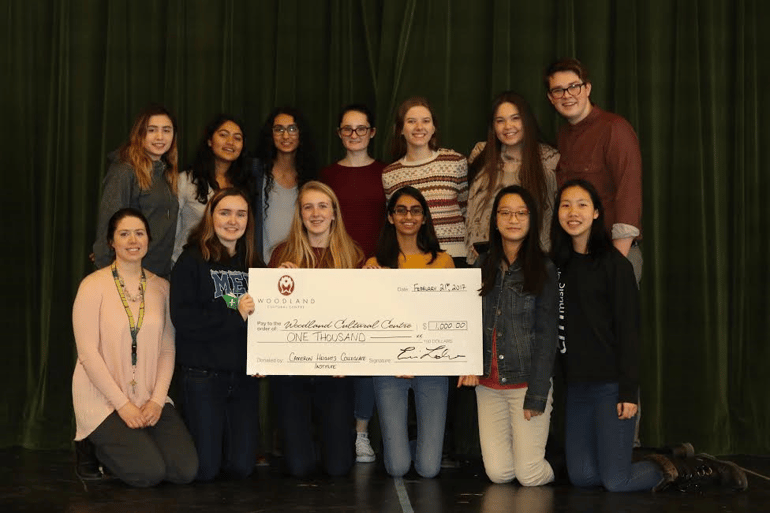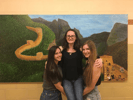1.Before this year, did you know anything about the Canadian Indian Residential Schools?
A. I had only briefly heard about them a year prior by reading the book Indian Horse, which talked about the school that the protagonist was in, but no more than just that. So I knew they were bad, but I didn't know the extent of how cruel Residential Schools really were and how widespread it was across the country.
B. I actually had some prior knowledge about the Residential Schools in Canada from my history classes both in elementary school and high school. I knew about them from watching documentaries when I was younger. It was occasionally brought up in my classes growing up, I think to remind us that while Canada is a great place to live it still has dark parts to its history.
C. Not much, only what had been briefly covered in history class. I honestly didn’t think much of them, ever, so this year was extremely awakening.

2. What questions were being raised in your class as you studied the Indian Residential Schools?
A. We talked a lot about how the Residential Schools have led to continued cycles of prejudice and discrimination against Aboriginal people. I think one thing I questioned a lot was how the prejudices and misconceptions which were voiced by a past government, are still present today. There does tend to be a line between “us” and “them” that is sadly still visible today because of the ideologies which previous generations had. We also watched former Prime Minister Stephen Harper’s apology to the victims of the Residential School system and questioned not only the sincerity of this apology, but also why it took so long for this apology to be made.
B. As we studied the Residential School system there seemed to be an overall confusion as to why nobody talked about this. It is a huge part of Canada’s history and it is extremely hypocritical of us to look to the future with arms open to all when we, more or less, ignore how we treated and destroyed an entire group of people at one time and for every following generation.
3.What have been the most significant realizations studying this history?
A. I never realized how dark Canada’s past and present still is. Being a privileged Caucasian, life has never been terribly difficult regarding race and discrimination, so for a good part of my childhood, I didn’t even know this stuff existed across the world. Growing up, I realized there were problems in this world, but I never knew how discriminatory Canada could be. And until recent years, I do not feel like our country did enough to acknowledge the harm committed towards the Indigenous community. I feel like Canada puts up a face, saying the people are so polite and it’s a peaceful country, and it forgets about it’s dark past.
4. How has your view of Canadian History and Identity changed?
A. I feel very blind-sided by the information I have been taught. Growing up in an all French school, in history class we learned about the French relationship with Canadian history, and we learned a lot about Indigenous people actually. We learned about the Métis for one, and how the French army and the Indigenous army fought together against the English. But we never learned about the Residential Schools whatsoever. Our teachers might’ve thought we were too young to learn about the Residential Schools, but I feel betrayed almost because I was taught that Canada had a clean slate and never did anything bad. So how did my views change? I finally realized we were just like every other country who had slaves, or genocides, or nation wide discrimination on a certain group, and not America’s peaceful and innocent neighbour.
B. For me, the hardest realization was that, while I consider myself to be an accepting, kind-hearted and generally non judgmental person, I did have a little bit of prejudice ingrained in me about the Indigenous groups of Canada. Maybe because I felt I didn’t fully understand their culture or because being a generally more privileged individual in society, I just didn’t completely empathize with their situation because I myself hadn’t gone through anything remotely close to that kind of discrimination. I think this course really opened up my emotional understanding of what the victims of Residential Schools had gone through and continue to go through rather than simply my factual understanding of the events that occurred.
C. In studying this history I realized that this history, though different from my own experiences, has truly shaped my life. I live comfortably because others did and do not. My view of Canadian History and identity has changed because of that hypocrisy. We must learn to respect our Indigenous cultures if we will continue spouting the benefits and necessity of cultural acceptance and tolerance. What kind of example do we lead if we only practice what we preach half the time, and throughout history, not at all.
5. Tell me something about the day Geronimo Henry spoke to your class?
A. Geronimo’s presentation was extremely eye-opening. There is this amazing thing with survivor testimony that really reaches every single person in a room. Survivors really allow an understanding on a personal level. You get to see how that individual person was affected by the experience and to see someone feel emotion, has much more on an impact than words in a textbook.
B. Seeing and hearing Geronimo speak was what really helped me to open up emotionally to the issue and impact of the Residential School system. I oftentimes view things in history as only events, separate from the people who went through them. I think this is because, emotionally, it is so hard to envision what it would be like to go through what others went through just from reading words off a page. Geronimo gave such an honest account of his experience and you could so clearly feel his experience from his talk that it was a completely different and eye opening experience than watching a video or reading about it in a book.
C. I remember how strange it was. Having learned about the Residential Schools is one thing but meeting someone who went lived through them is another. It was so strange knowing the person standing before me held in his head scars of the horrors I was learning about, he probably also held physical scars too. It just made learning about Canada’s dark past so much more real.
6. How did you come to the decision that preserving the evidence at the Mohawk Residential School was what the class should fundraise for? (Something you read/discussions that were had?)
A. Mrs.Ledlow was the one who told us about the Mohawk Residential School and asked if we would be interested. I love history a lot and I think the preservation of historical buildings is really important. I mean, I even take pride in the fact that I live in a century home and it’s just a house! My love for history is what makes me so passionate about preserving this building. It stands as a physical reminder about the past and the horrible things the victims were forced to go through at the hands of the Canadian government's “cultural genocide”. It is so important to face this part of our history as Canadians and preserve it to keep it as a reminder for future generations and to not let what the victims had to go through disappear over time.
7. How did your class raise the $1000? Was $1000 your goal?
At our school we have Monday morning charities to announce the weekly events and to collect money from students towards the monthly charity that our school supports. Our Crimes Against Humanity class partnered with our Student Activities Council to make the Mohawk Residential School the charity of the month. We had the incentive of a pizza party for the class that raised the most money to promote the charity, and to encourage people to donate. Originally we didn’t know how much to expect from charities, but by the end of the month we had raised $800 so we decided to extend it another week and ended up raising $1000.

8. In what way has learning the history of Canadian Indian Residential Schools defined what it means to you to “Face History and Ourselves?”
A. I think that learning about the Canadian Indian Residential Schools helped me to realize many things about myself. I mentioned above I became more emotionally aware of the situations faced by others in my country rather than simply factually aware. It also enhanced my learning of Canada as a country and the relationships that our country has with our own people. I think this is really important because through learning about this I realized that reconciliation is such an important part in terms of healing our nation. A simple apology and pushing the issue under the rug will not suffice. We cannot ignore history and I think a lot of people try to do that. The best thing we can do is learn from these events and and make sure they are not forgotten in order to ensure that these events don’t happen again. From education and developing an understanding about other people’s struggles, we can help to ensure that the events of the past are not forgotten nor repeated.
B. Learning of Canadian Residential Schools in such detail, and other genocides, taught me that in order for us to stop making the same mistakes over and over again, we must look back at history and learn from our past, instead of ignoring it. Furthermore, we must not only look at the mistakes of others, but those of ourselves, if we want to grow and improve. History is truly the ultimate way to tell if our future endeavours will be successful. Today we too often see signs of history repeating itself and if we simply look back and learn from the past outcomes, we could be so much better.
9. Many students want to take action and get involved in making a difference, but feel like it is to hard, or that they can’t make a big enough change. What advice would you give to these students?
A. I’d tell them that people don’t place enough value on the little things but it really is the little things that matter. You don’t have to set out to create big change because it really is those little things that create the big things in the end. Even just educating yourself is so important and if you can pass that education on to others, that's even better. I’d say use your skills and the things you are passionate about to get involved, making a difference and taking action comes in many forms and you don’t have to put yourself in an uncomfortable position to do something even if you feel it is the “traditional” way. Another one is to use your resources. Use the people around you and find people who support you and even utilize technological resources because creating change is hard but it’s even harder if you’re trying to do it by yourself.
B. It is scary. It is intimidating. You don’t feel like what you’re doing will work or make any impact. It takes a lot of effort at times when all you want to do is anything else. But in the end, the “scary”, the intimidation, the doubts, and the effort is all worth it. You get the satisfaction of knowing that you did something when everyone else watched. My advice would be as follows: I'm sure you’ve heard the quote “well behaved women seldom make history," so be irrational. Make noise. You will not incite change with euphemisms and a cheesy grin. Show your passion. Sometimes we have to disturb the comfortable. My second piece of advice is to find someone as passionate about your cause as you are. I was lucky enough to find 20. There is so much strength in numbers which, as this course has taught me, can be good and bad, so use it to your advantage, to inspire you.
C. I often felt the same. Honestly, I still feel that way with so many things. But I think the best thing to do is to first find a group of people who are willing to take that first step with you. Everything seems so big and overwhelming when you’re the only person out there, but once you have a team, the task at hand is always less daunting. Secondly, my advice is to start small. There are many world-wide problems that I want to help out with but they are just so big it feels impossible. But after working on the Save the Evidence campaign, I know a little more on how to help, and I gained a little more courage to take on more initiatives.
Want to Know More?
Get involved with Save the Evidence Campaign
Stolen Lives: Indigenous Peoples of Canada and Indian Residential Schools Summer Seminar
In this seminar we will explore the history of Canada’s Indian Residential Schools through primary source texts and survivors’ personal testimonies to better understand the devastating history and long lasting impact on former students, their families, and entire Indigenous communities.
Democracy at Risk: Holocaust and Human Behaviour
This seminar features the fully revised, printed edition of Holocaust and Human Behavior and is intended for teachers of history and other social sciences, English, arts, media, philosophy, and politics.
CHC2 Canadian History through a Facing History Lens Seminar
This seminar will provide grade 10 history teachers with content and strategies to help students explore Canada’s social history. We will also introduce participants to Facing History and Ourselves’ unique pedagogical approach which supports inquiry skills and the creation of meaningful learning in the classroom.

